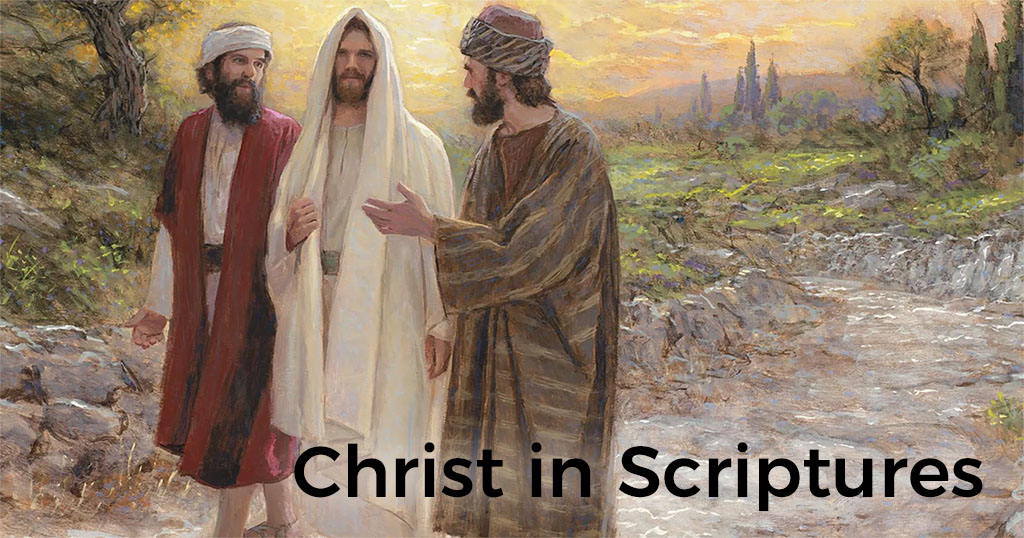
I believe it’s important to, as much as we can, learn as much as we can from the Scriptures themselves. This is no knock against theologians, scholars, or philosophers that aid our understanding of the Scriptures. However, more often than not, many will think they have grasped the totality of theology because they can think about it theoretically but lack its true essence in practice. For instance, we can learn all the different types of prayers, their names and use through the pages of the Bible, break down Jesus’ Model prayer, or extract all the evangelistic content from His priestly prayer. Still, none of that will do us a bit of good if we neglect the act of praying. What good is it to study the terminology of prayer from various bible characters if we overlook their example in praying? Such is the case, and I want to say, not only of prayer, evangelism, and the other major Bible themes but also of Biblical study in general. The Scriptures depict how we can study and find Christ as the token and beacon of revelation.
In my devotions, I was pleased to see how the Hebrew writer, whether Paul or Apollos, demonstrated how to examine Scripture to discover Christ therein. We first must admit that per Christ, we must “search the Scriptures…for they are they that testify of me.” So here is where we start our journey; the Scriptures, whatever else they reveal of history, the philosophy of the day, the manner and customs of the culture, essentially testify and bear witness of Jesus Christ. More than anything, if we see all allegories and understand all parables and wise sayings but miss Christ, we remain blind to the true purpose of Scripture. Christ is the beginning and the end of Biblical revelation. Remarkably the writer of Hebrews showcases how to “exegete” passages of Scripture to reveal the “hidden” Christ therein.
Here are the verses that piqued my interest today.
“For He has not subjected to angels the world to come that we are talking about. But one has somewhere testified: What is man that You remember him, or the son of man that You care for him? You made him lower than the angels for a short time; You crowned him with glory and honor and subjected everything under his feet. For in subjecting everything to him, He left nothing that is not subject to him. As it is, we do not yet see everything subjected to him. But we do see Jesus — made lower than the angels for a short time so that by God’s grace He might taste death for everyone — crowned with glory and honor because of His suffering in death.”
– Hebrews 2:5-9 [HCSB ]
Here, the writer refers to the 8th Psalm of David, particularly verses 4 through 6. David is speaking about the wondrous dealings between God and man, contrasted by the greatness of the cosmos God created. Of all the splendor and beauty beheld in nature, it is man-mankind that God is mindful of and visits. God even crowns humanity with glory and honor and tells us to have dominion over the earth. Though this accurately depicts human creation as the hallmark of God’s created beings on earth, the writer of Hebrews dug deeper and something beyond humanity; he saw Jesus. The Scriptures unveiled to his eyes the blessed incarnation of the Son of God into a human frame, “being made lower than the angels,” His sacrifice made unto God which, as a result, merited “glory and honor, and subjected everything under his feet.” The writer wisely comments this wasn’t alluding to angels nor David but was performed in the life of Jesus, His humiliation and suffering whereby He tasted death for every man, who received glory and honor. The writer of Hebrews employs this method throughout his entire letter, and we would do well to study how the writer sees Christ through the words and works of men from Moses to the Prophets.
This is only a small excerpt of how Christ is hidden in the Scriptures, but this is how we should read, study, and investigate them. Yes, they convey theological truths about the Godhead, the soul, sin, and the world to come, but we must not ignore Jesus, of which the law and its instructions were tutors. We mustn’t neglect the faithful witness of the Word about The WORD. It is the testimony of Jesus that is the spirit of prophecy. He is the Emmaus Evangel who, in Luke 24:27, “Then beginning with Moses and all the Prophets, He interpreted for them the things concerning Himself in all the Scriptures.” He is the Word of Life, the Logos of God, the true Imago Dei, concealed in the Old Testament and revealed in the New Testament. If we miss Christ, in all of our perusing of the Scriptures, we miss the message of heaven and God Himself, who “Long ago God spoke to the fathers by the prophets at different times and in different ways. He has spoken to us in these last days by His Son.” Let us fix our eyes upon Him, the author and finisher of our faith, and find in Him the adequate expression of God’s will for our lives modeled in the life of Lord Jesus Christ.

0 Comments